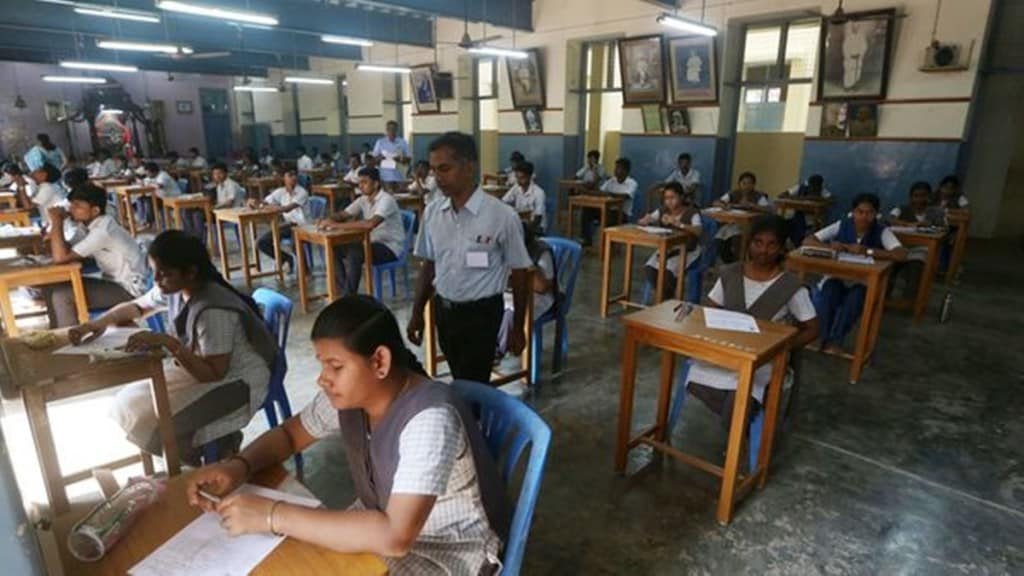By Ashok Pandey
India’s K-12 education system is deeply rooted in high-stakes board examinations, with Class 10 and 12 results shaping a student’s academic and career trajectory. The stress induced by these exams is immense. A nationwide study published in ‘Mental Health and Well-being of School Students: A Survey Report’ (NCERT, 2022) revealed that 81% of students experience exam-related stress.
The proposal to conduct Class 10 board exams twice a year under the NEP 2020 aims to alleviate stress by offering students another opportunity to improve their performance. While this initiative has its merits, it does not fundamentally address the core challenge – the examination-centric evaluation system. Instead of relying solely on frequent testing, the focus must shift towards holistic, competency-based assessments that prioritise learning and long-term student well-being.
The core issue with biannual board exams
The introduction of biannual Class 10 board exams may disrupt the academic calendar. Students who appear for the second attempt will receive their results late, causing significant delays in transitioning to Class 11, where sessions typically commence in April.
Moreover, changing streams based on improved scores may not be feasible in many schools due to rigid admission policies. The CBSE’s public consultation document suggests that students failing in the first round may be promoted to Class 11, pending the result of the second attempt, but the feasibility and implications of this approach remain unclear.
Teachers already juggle multiple responsibilities beyond classroom teaching. According to ‘UDISE+ 2021-22, World Bank Data, 2019’, and ‘The Accountability Initiative’s Time Use Study (2018)’, teachers spend a considerable amount of time on administrative and non-academic tasks. The introduction of biannual board exams will further extend their involvement in out-of-class duties, reducing the time available for regular teaching and student mentoring.
Scaling PARAKH for a more holistic evaluation
The Performance Assessment, Review, and Analysis of Knowledge for Holistic Development (PARAKH) framework, established under the NEP 2020, has demonstrated positive outcomes in school-based assessments. Research indicates that multidimensional assessment – which evaluates students across competencies, perspectives, and real-world applications – significantly enhances critical thinking and student engagement. Expanding this initiative nationwide could reduce dependence on high-stakes board exams.
The growing student population: A call for tech-based disruptions
With 4.3 million students appearing for the CBSE board exams in 2026, consuming a long exam cycle, increasing exam frequency will further strain resources. Instead of merely repeating the traditional assessment model, technology-driven alternatives should be explored. AI-powered adaptive testing, portfolio-based evaluations, and holistic progress tracking can provide a more meaningful and efficient way of assessing students. The PARAKH framework has already proposed treating Classes 9 to 12 as a continuum, with the final Class 12 report card drawing 40% weightage from Class 12 and remaining 60% from Classes 9 to 11.
The way forward
A more effective strategy would be an assessment approach that integrates board exams with structured school-based evaluations and AI-driven adaptive testing. Schools should be empowered with training on fair and objective assessment practices, coupled with independent monitoring mechanisms to validate results. Additionally, leveraging digital tools and insights from the Key Stage Assessments (classes 3, 5 and 8) and National Achievement Survey can facilitate multi-year assessment tracking, enhancing teaching and learning standards while reducing reliance on multiple exams.
The move to biannual board exams is a step towards addressing student stress. The need, however, is to resolve deeper issues within India’s examination-driven system. Instead of relying solely on increased exam frequency, the education system must embrace a broader transformation – one that integrates competency-based assessments, AI-powered evaluation tools, and real-world skill development. The question is: “Do we want an education system that reinforces memorisation twice a year, or one that cultivates lifelong learning and practical competencies?”
The author is chairperson, the Council for Global Citizenship Education.
Disclaimer: Views expressed are personal and do not reflect the official position or policy of FinancialExpress.com. Reproducing this content without permission is prohibited.

